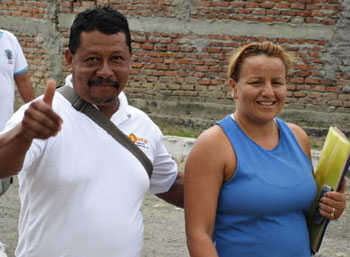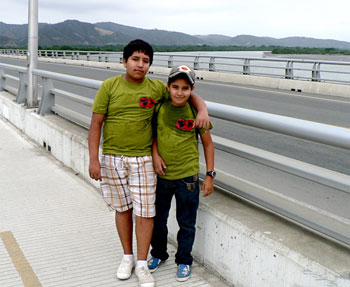Planet Drum Foundation
Bioregional Education Program
Report #2, July 2011 – English
(Click here for Spanish/Español)
Teacher: Margarita Avila Napa [aka Plager-Unger]

Today’s theme is Birds. We begin with a handout prepared by Planet Drum. Each student read a part of the article. Then we analyzed the text and shared ideas. Afterwards, we answered the questions.
Everyone is present today. Even though my students are the oldest of all the groups, they still show lots of interest in the material and in caring for the environment. Almost all of them are very connected to technology. It’s a little more difficult, but not that complicated to take their cell phones away for two hours during class.
Today, with the help of Abraham, my assistant, we took a side fieldtrip to the oxidation pools of Bahia. This place is located behind the Fanca neighborhood. It’s where the waste water of Bahia, Leonidas Plaza and Kilometro 8 is processed.
This is where all of the water we use and waste goes. The water from bathrooms and kitchens, as well as the street drains when it rains ends up here.
The students quickly realized that this wasn’t a normal fieldtrip. We saw how all the trash from the streets that ends up in the drains gets here as well. We saw used diapers, plastics, papers, and other waste. This garbage doesn’t just affect the city; it affects our health and the health of the ecosystems that surround us.
If the estuary is dirty, the fish can get sick; that makes the birds sick and even the humans could get sick. The future is in our hands and if we don’t take care of the planet, soon it could become completely contaminated.

There are three oxidation pools. In the first, the water from the pipes arrives with all of the garbage already mentioned. By the second the garbage has been separated and bacteria in the water along with natural chemicals continue to break down the waste. In the third pool, the water is ready to be reused. It will either run into the estuary or could be used to water trees that have been planted in the area.
This is a project that is actually helps keep the city clean. And that was my “dynamic” for the day.
Fundación Planet Drum
Bioregionalismo
Julio 2011 – Spanish/Español
Profesor: Margarita Avila Napa [aka Plager-Unger]
Nuestro tema de hoy es el de las aves. Empezamos con la lectura preparada por Planet Drum. Cada uno de los integrantes lee una parte del artículo. Lo analizamos y compartimos ideas entre el grupo.
Hoy estamos todos y a pesar de que mis chicos son los más grandes de todos los grupos, se les ve su interés por cuidar el medio ambiente. Casi la mayoría de ellos están muy apegados a la tecnología. Es un poco más difícil pero no tan complicado para quitarles sus teléfonos por dos horas de clase.
En este día, con ayuda de Abraham, hicimos una visita a las pozas de oxidación de Bahía. En este lugar que está ubicado en Fanca es donde pasa una parte de todas las aguas residuales de Bahía, Leonidas Plaza, y Kilómetro 8, por ahora.
A ese lugar llegan todas las aguas que utilizamos y desperdiciamos, por ejemplo: la que ocupamos en nuestros baños, la que ocupamos en la limpieza de cocina, y las de las alcantarilladas de la ciudad cuando llueve.
Como se dieron cuenta los estudiantes, no fue un paseo común. Vimos que la basura que botamos en la calle va a parar ese lugar por las alcantarilladas, como los pañales, plásticos, papeles, y los desperdicios que botamos por la coladera de la cocina. Esto no solo afecta a la ciudad, afecta a nuestra salud y a los animales tantos marinos como las aves porque estamos conectados.
Si el estuario está sucio, los peces se enferman y por consiguiente las aves también y hasta nosotros mismos. Nuestro futuro está en nuestras manos si no cuidamos nuestro planeta en pocos años quedara desbastado.
En ese lugar existen tres piscinas. En la primera, el agua llega con todo los desperdicios ya mencionadas. En la segunda, el agua está sin residuos y sus propias bacterias descontaminan esa agua con ayuda de químicos naturales. En la tercera, ya está lista el agua para ser reutilizada. Va a llegar al estuario y también sirve para regar árboles de la zona.
Esto es un proyecto que en realidad está ayudando mucho a la ciudad. Y así realice mi dinámica de hoy.

Thank you for your sharing. I am worried that I lack creative ideas. It is your article that makes me full of hope. Thank you. But, I have a question, can you help me? https://accounts.binance.com/register?ref=P9L9FQKY